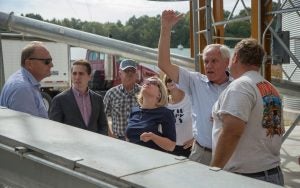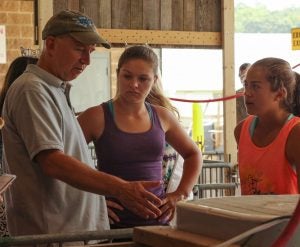As the number of people involved with agriculture is decreasing and as social media allows for misconceptions to spread like wildfire, we now have the responsibility of providing education as well as food. The USDA states that more than 90 percent of the population is not involved with ag production. This disconnect leads to misconceptions that can spread easily throughout social outlets and even the news.
In response, events where the non-ag public visits farms or farmers visit with consumers at public locations such as grocery stores are growing in popularity. The agriculture industry is becoming increasingly dedicated to the idea of educating consumers about what it really takes to run a modern farming operation. In recent years farm tours and the buzzword “agritourism” are flooding the industry as the ag community attempts to increase the public awareness of today’s farming methods.
Field days and tours can be beneficial in a variety of ways. They allow for consumers to see with their own eyes what a modern farm looks like, and make judgments off of this experience rather than what they see on social media or in the news. Field days allow consumers to ask farmers questions and interact with them first-hand, which establishes credibility as the farmer is viewed as the expert in his or her industry. This also gives the farmer the chance to form positive relationships with consumers, and build more trust between the farm and table.

Farmers can use their many resources to their advantage, and make these events more beneficial for them. For dairy and livestock operations, having a veterinarian or nutritionist on site to present information to the visitors would allow for the public to gain a better understanding of the care the animals receive. If the farm is a member of a voluntary environmental program, an example would be the Michigan Agriculture Environmental Assurance Program, farmers can provide the public with an explanation of the steps that the farm takes to be a part of this program. Events held on the farm, create numerous opportunities for both consumer and farmer. However, is the hassle and potential liability of opening up a farming operation for public viewing worth it in the end?
Many would argue that these types of events do make a difference. Consumers who are able to witness first-hand a farming operation and ask farmers questions have a better outlook on modern farming. Michigan State University Extension launched the Breakfast On The Farm program in 2009 and has had huge success with changing public perceptions of modern agriculture. According to MSU Extension, an exit survey asked visitors of a BOTF dairy farm program if their impression about modern dairy farming was improved. Over 90 percent agreed that the visit overall improved their perception.

Those in Michigan are not alone, across the country other state agriculture industries are investing into similar programs. The Butler County Farm Bureau in Kansas offers a program called Farm to Fork, where once again the public is invited to farms and is given information about modern agriculture. After a successful first year in 2017, this year the program is being expanded. In Florida, a state known for its tourism, the ag industry uses this to their advantage through agritourism. From a citrus operation to an alligator ranch and most everything in between, the public has the opportunity to tour just about any type of agriculture operation. On the other side of the country, Washington State University Extension offers a farm tour program annually that leads thousands of attendees through various local farming operations in two days. Across the nation, the non-ag public is able to have hands-on experiences with working farm operations, while farmers are able to combat the many misconceptions about agriculture.
One only has to take a look at an average news feed on Facebook or Twitter or watch any number of news outlets to see there are misconceptions about agriculture. If those of us involved in agriculture do not educate others, either by using farm tours or any other means, we leave it to chance — to the chance that the non-ag public will be educated by individuals who have never stepped foot into a field; to the chance that they will be educated by someone who has never worked with livestock; to the chance that they will be educated by anyone else but the experts in this field, the farmers.
Farmers have the incredible opportunity to change the way the non-ag public views agriculture. It is vital to the livelihood that we all love to take that opportunity.
Nicole Jennings is a recent graduate of the University of Findlay, with a major in Law and Liberal Arts and double minors in Political Science and Business Administration. Having agriculture roots on both sides of her family, she is dedicated to “agvocacy” and serving the agriculture community.



